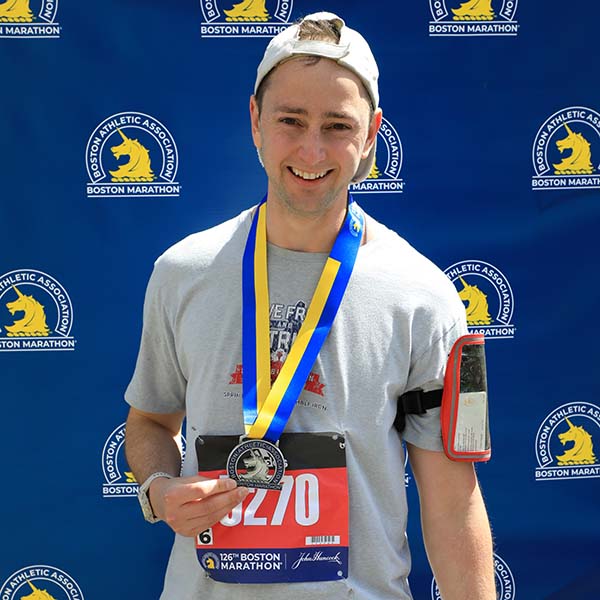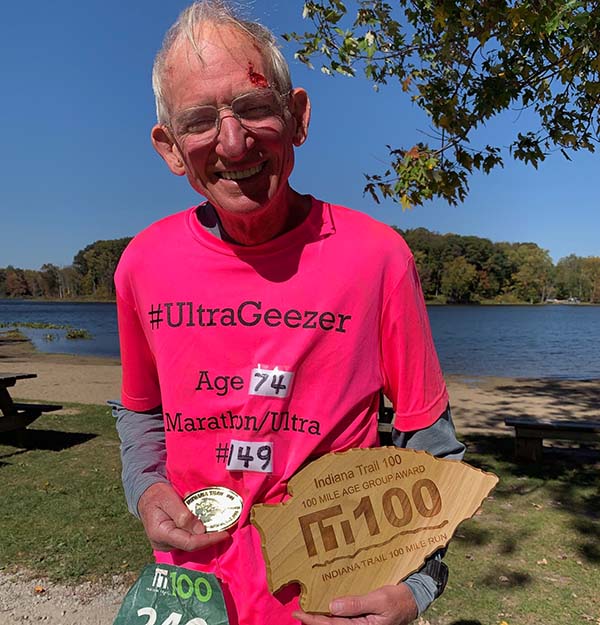This year marks the tenth anniversary of the Boston Marathon bombing. Gene Dykes ’70 ran the race the year after the bombing and felt the sky-high energy of a city demonstrating its resiliency.
He is familiar with the downhill opening mile, Heartbreak Hill, the train tracks that trip up runners at mile 23, and the Citgo sign that marks the home stretch. He’s run the race more than a half-dozen times and set the course record of 2:58:50 in the 70-74-year-old age division.
He’s older and runs long distances (100- and 200-milers), thus his self-given moniker: UltraGeezer.
Then there is the alumnus we are calling the WhipperSnapper. Evan Gaj ’16 ’17G is running his second Boston Marathon this year. Last year he completed the course in 3:24:33.
Together, they sit down to talk about diet, training, running, and their love of Lehigh.
 First Run
First Run
Dykes: I was around 10 years old and went on a run. A mile in, I had to stop and walk. I felt a bit ashamed at that. So I started running more often. Jogging at this point was unheard of. I did join the track team in high school.
Gaj: In high school, I joined the cross country team, then winter track, and then spring track and field. So I was a three-season runner.
Lehigh
Dykes: I was blown off the track at Lehigh when I ran for coach John Covert, so I taught myself the hurdles and triple jump so I could earn some points for the team.
Gaj: I didn’t run as a member of the Lehigh track team, but I was active with the running club. There are so many beautiful places to run on campus.
Dykes: For three straight years, my residence hall won the Turkey Trot race. Do they still have the Turkey Trot?
Gaj: They do!
Dykes: I came to Lehigh as an engineering major, but I wasn’t liking it. I went to my adviser, who asked, ‘What do you enjoy studying?’ That question was an important moment for me. It seems so obvious when I think about it now. I enjoyed studying biology and chemistry. So I switched majors.
Gaj: I was a mechanical engineering major and then stayed an extra year to earn my master’s degree in mechanical engineering.
Dykes: My second important moment on campus came when I saw a flier for a computer programming seminar. I went and became hooked. It became my entire career despite earning my Ph.D. in biochemistry at Cornell.
Gaj: A seminal moment for me was my Fulbright award. I conducted research in Warsaw, Poland, at the Warsaw Institute of Technology from September 2017 through July 2018. I also taught English at a local middle and high school. I also was a member of the Air National Guard and am currently a member of the Armed Forces Communications & Electronics Association Lexington-Concord Chapter. We held a 5K Fun Run For STEM, organized by me and Will Keller ’15, and raised $10,000 used to support local high school programs.
 Running
Running
Dykes: I slowed on running after Lehigh and concentrated on golf and bowling. Even though I was rolling the occasional 300 game, I eventually gave bowling up because bowlers are bums. Few seem to seriously want to improve. I always imagine when I die that I will go up to the Pearly Gates and St. Peter will ask me to pick from a bucket whom I want to spend eternity with. I am picking from the runner’s bucket because you are almost guaranteed to draw a really nice person. If I am told to pick from the bowler’s bucket, I think I might choose hell instead.
Runners are the best people. I resumed running when I was 56 years old. I was completely unaware of the racing scene. I now run events of distances from 5K to 200 miles. I have a 12-hour race in May, a 50-mile and 100-mile race in June, and a 200-mile race in August. I average about two 100-plus-mile races a year. I run the ultra races for fun. It is a much slower pace — a 14- to 18-minute mile for 100s. Distance running in the ultra races gives me a base for speed in my road season. I average 47 miles a week and 2,800 miles a year.
Gaj: That’s impressive. So many runners’ bodies wear down. I average 6.5 miles on my running days. How do you keep it up?
Dykes: I race almost every weekend, but I have a coach who schedules my training around them. Sometimes things don’t go as planned. I am nursing a thigh injury, so I’m bowing out of several of my road races and concentrating on the ultra trail races because my injury doesn’t seem to be affected by long, slow paces.
Boston
Dykes: It is a special event because you have to qualify, and it is often the one race everyone in the country grows up hearing about.
Gaj: I am excited to be part of it this year and will be running with another Lehigh alumnus, Mike Horgan ’16. What advice would you give?
Dykes: I don’t really have any special strategy. I think about it in the same way as I think about all marathons — expending an equal amount of effort on each mile. If you are dying in the second half, then you went out too fast!
Gaj: I crashed at the Bay State Marathon and learned that lesson.
Dykes: Many think that you have to push going uphill and coast going down to maintain an even pace. But the opposite is true. Even though the last five miles in Boston are mostly downhill, it is really a terrible ending if you don’t push yourself.
Gaj: Last week, I did some hills just to get ready for that section.
Eating
Dykes: I’m on what they call the ‘seefood diet.’ If I see it, I eat it.
Gaj: There is a tradition most runners have: eating a big pasta meal the night before a race.
Dykes: I generally think that runners eat too much prior to a race. I run empty, skipping breakfast before a race. I’d rather have the blood going to my muscles than to my stomach. I do the same while training. It is important to build up your glycogen stores as a runner. Then you have the energy to last a race. At some point runners realize that feeling tired during a run doesn’t mean you didn’t have enough fuel. That feeling comes from a lack of glycogen.
Inspire
Gaj: I think running is a good metaphor for life. Both require discipline and a clear mindset. The effort you put in is tied to the outcome.
Dykes: There are so many ways to enjoy running. Some run for the solitude. Some run socially. Some like the competition. Some like the scenery. Some want to overcome hardships. If there is a part you don’t like about running, there are easy ways to avoid it. Sure, the first run might hurt a bit, but that isn’t about running. That is from being out of shape. As you continue to run, you will feel better, run longer, walk less, and get faster. Like I always say, “Just run.”